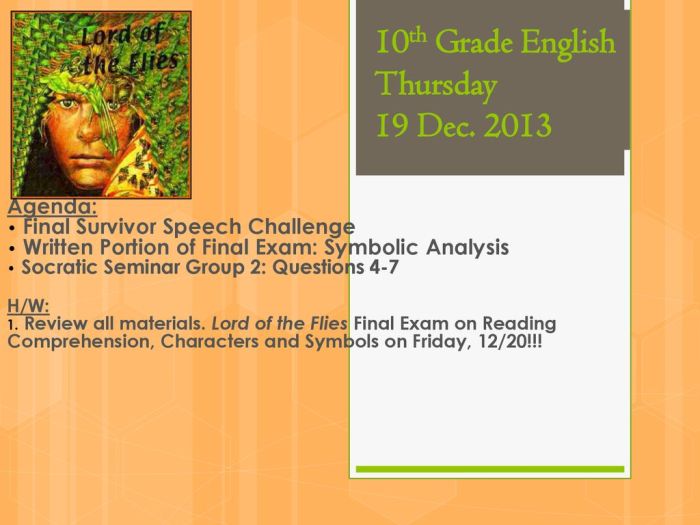Lord of the flies socratic seminar questions – Delving into the enigmatic world of William Golding’s “Lord of the Flies,” this Socratic seminar invites participants to engage in a profound exploration of the novel’s timeless themes and profound insights into human nature and the complexities of society. Through a series of thought-provoking questions, we will delve into the characters’ motivations, the novel’s symbolism, and its enduring relevance to contemporary issues.
Prepare to embark on an intellectual journey that will challenge your assumptions, stimulate critical thinking, and deepen your understanding of one of literature’s most enduring classics.
Thematic Analysis
Lord of the Flies explores several central themes, including the fragility of civilization, the destructive power of fear, and the struggle between good and evil.
The novel’s characters, a group of boys stranded on a desert island, initially attempt to establish a civilized society, but their efforts are quickly undermined by fear and mistrust. The boys’ descent into savagery reveals the fragility of human civilization and the ease with which it can be destroyed.
The novel also explores the destructive power of fear. The boys’ fear of the unknown, symbolized by the “beast,” leads them to act irrationally and violently. This fear ultimately destroys their society and many of its members.
Finally, Lord of the Flies explores the struggle between good and evil. The novel’s characters are constantly torn between their better and worse instincts. This struggle is ultimately unresolved, leaving the reader to ponder the nature of human nature.
Character Analysis: Lord Of The Flies Socratic Seminar Questions

Lord of the Flies features a cast of complex and memorable characters. The novel’s protagonist, Ralph, represents the forces of civilization and order. He is opposed by Jack, who represents the forces of savagery and chaos.
Other important characters include Piggy, the intellectual who is ridiculed for his intelligence; Simon, the visionary who is killed for his insights; and Roger, the sadist who takes pleasure in inflicting pain.
The characters’ actions and interactions contribute to the overall plot of the novel. Ralph’s attempts to establish a civilized society are constantly undermined by Jack’s savagery. Piggy’s intelligence is ridiculed, and Simon’s insights are ignored. Roger’s sadism leads to the death of Piggy and Simon.
The characters’ behavior has psychological and social implications. The boys’ descent into savagery reveals the dark side of human nature. The novel suggests that civilization is a fragile construct that can be easily destroyed by fear and mistrust.
Symbolism and Allegory

Lord of the Flies is rich in symbolism and allegory. The island on which the boys are stranded represents the world. The boys’ descent into savagery represents the loss of innocence and the fragility of civilization.
The “beast” that the boys fear is a symbol of the darkness within themselves. It is also a symbol of the unknown and the forces that can destroy civilization.
The novel’s characters are also allegorical figures. Ralph represents the forces of civilization, Jack represents the forces of savagery, Piggy represents the intellect, Simon represents the visionary, and Roger represents the sadist.
The novel’s symbols and allegories contribute to its meaning by providing a deeper level of understanding. The island, the beast, and the characters all represent aspects of the human condition.
Popular Questions
What is the central theme of “Lord of the Flies”?
The central theme of “Lord of the Flies” is the inherent savagery and darkness that lies within human nature, especially when stripped of the constraints of civilization.
How does the novel explore the conflict between civilization and savagery?
The novel depicts the gradual descent of a group of British boys into savagery after being stranded on a deserted island. As they struggle to establish order and survive, their primal instincts take over, leading to violence, chaos, and the breakdown of society.
What is the significance of the conch shell in the novel?
The conch shell represents order, civilization, and the rule of law. When it is broken, it symbolizes the loss of hope and the triumph of savagery.